| It is widely known that royalties and nobilities of the capital city Kyoto
during the Heian and Kamakura periods (710-1191) often made a hard trip
to visit "Kumano Three Grand Shrines", and this became to be
called as the visit of ants to Kumano (Ari no Kumano Moude). The three
Kumano shrines are Hongu Grand Shrine, Hayatama Grand Shrine and Nachi
Grand Shrine.
In Edo period (1603-1868), so many common people visited Ise Shrine and
Kumano Three Grand Shrines that there is a saying "Seven times to
Ise and three times to Kumano" (Ise ni Nanatabi Kumano ni Sando).
Pilgrims treaded and treaded the roads to Kumano Three Grand Shrines. And
at last the following sub-routes came to be called Kumano Ancient Pilgrimage
Routes (Kumano Kodo) collectively. They are "Kiiji", "Kohechi",
"Nakahechi", "Ohechi", "Iseji" and "Omine-okugake".
Kumano Kodo and Kumano Sanzan, along with Koya-san (Mount Koya) and Yoshino
Omine, were registered as UNESCO World Heritage in July, 2004 as the "Sacred
Sites and Pilgrimage Routes in the Kii Mountain Range".
"Nakahechi" route is the most famous among them, along a part
of which we walked this time.
Today's route is 7 km from Hosshinmon Small Shrine to Kumano Hongu Grand
Shrine. It is one of the highlights of this tour.
Tomorrow we will walk another 1.5 km of Koyanozaka Slope in Shingu, my
hometown, which is the pass viewing Kumanonada Open Sea.
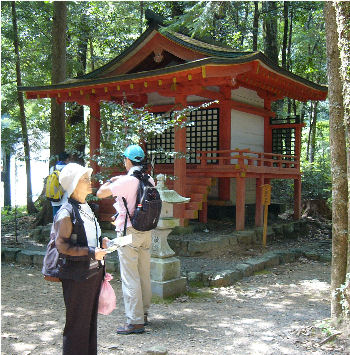
Hosshinmon Small Shrine
|
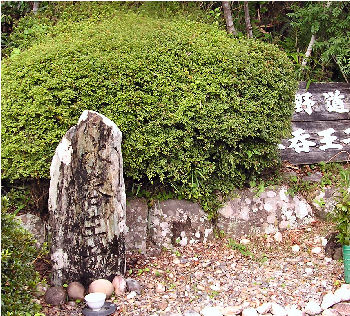
Mizunomi Small Shrine
There was a watering place here called "Inner Mizunomi" in the
old days, because of the legend that Saint Kobo pushed the ground by his
stick and then water sprang from.
|
|
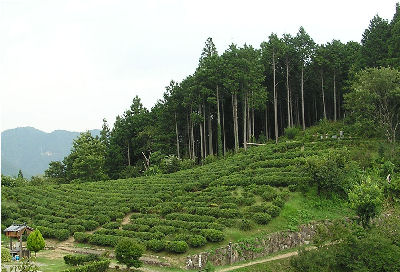 |
|
We saw green tea fields before the Fushiogami Small Shrine. The specialty
"No Sound Tea" is produced here.
The tea must be innevitable for cooking chagayu (rice porridge with tea)
of their local dish. |
|
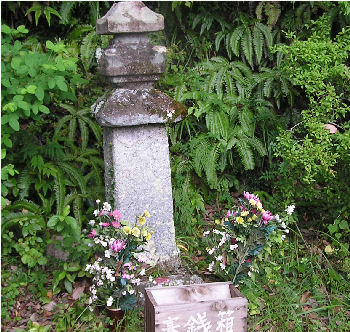
Fushiogami Small Shrine |
|
This shrine's name "Fushiogami" means to kneel to pray. It comes
from the story: visitors knelt to pray toward the grand shrine here.
Ohyunohara (the place of the original Hongu Grand Shrine) is visible from
here. |
|
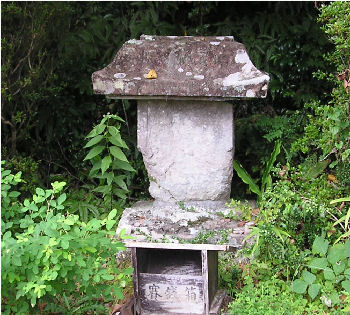
Memorial Monument of Lady Izumi Shikibu
|
Izumi Shikibu (a mid Heian period lady poet in 10th century) walked a long
way from Kyoto to visit Kumano.
During her stay she suddenly had her period. She reluctantly prayed toward
the Shrine from this place.
The following is her waka poem then, grieving her uncleanliness. |
|
晴れやらぬ身の浮き雲のたなびきて
月の障りとなるぞかなしき |
(Hareyaranu Mino Ukigumono Tanabikite
Tsukino Sawarito Naruzo Kanashiki) |
Clouds are floating in the sky,
while I am depressed.
They might obstruct
the appearance of the moon. |
|
|
| That night Kumano Avator appeared in her dream and returned the following
poem. |
|
もろともに塵にまじわる神なれば
月の障りも何かくるしき |
(Morotomoni Chirini Majiwaru Kaminareba
Tsukino Sawarimo Nanika Kurushiki) |
As I, the God, am strained
with the impurities of the world,
I do not mind any obstacle
against the moonshine. |
|
|
| Lady Shikibu accomplished the visit to the shrine, thanks to the avator's
consideration. |
|
|
 |
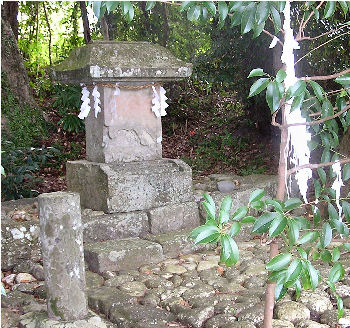
Haraido Small Shrine |
|
| Haraido Small Shrine was where pious people wiped the dust off and cleaned themselves. |
|
We felt the sunshine heat badly even though it was a flat mountain road.
We walked 7 km for 3 hours. Hosshinmon Shrine → Mizunomi Shrine → Fushiogami
Shrine → Haraido Shrine → Kumano Hongu Grand Shrine.
We hurried up a little bit because of the time limit. It was hard for me
to take pictures while walking fast.
Nevertheless the views impressed me was........
Hay fever season is over now. The woods around us are of Japanese cedars
and hinoki all right, however, they even have elegant appearance. I still
wished copses of beeches and oaks in addition.
I felt so cool, looking at bunches of rice hanging out in the Otonashi
(No-sound) tea fields and a simple small-shrine ruin.
The Hatenashi (Endless) mountains were a superb view suitable for the word
"jujoutaru" (piled up on top one another).
|
|
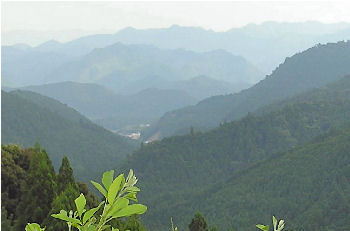 |
| - - - - - - - - - - - - - |
| The guides of Kumano Ancient Pilgrimage Routes are called "Kataribe"
(professional storytellers). They are guide specialists registered in the
sightseeing dept. of Wakayama Pref. as a "Kishu professional storyteller. |
|
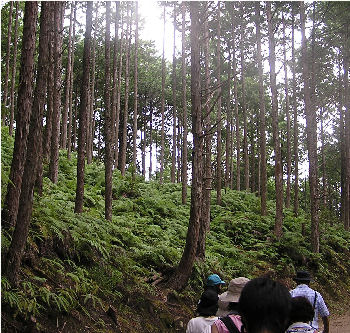 |
|
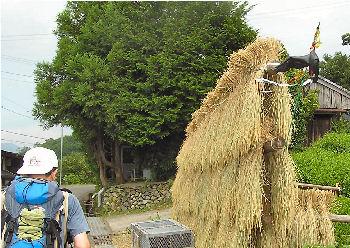 |
|
| Other Pictures 1 2 |
|
| Part 4 Reading: 8' 08" |
|
|
|
|
|
|
|